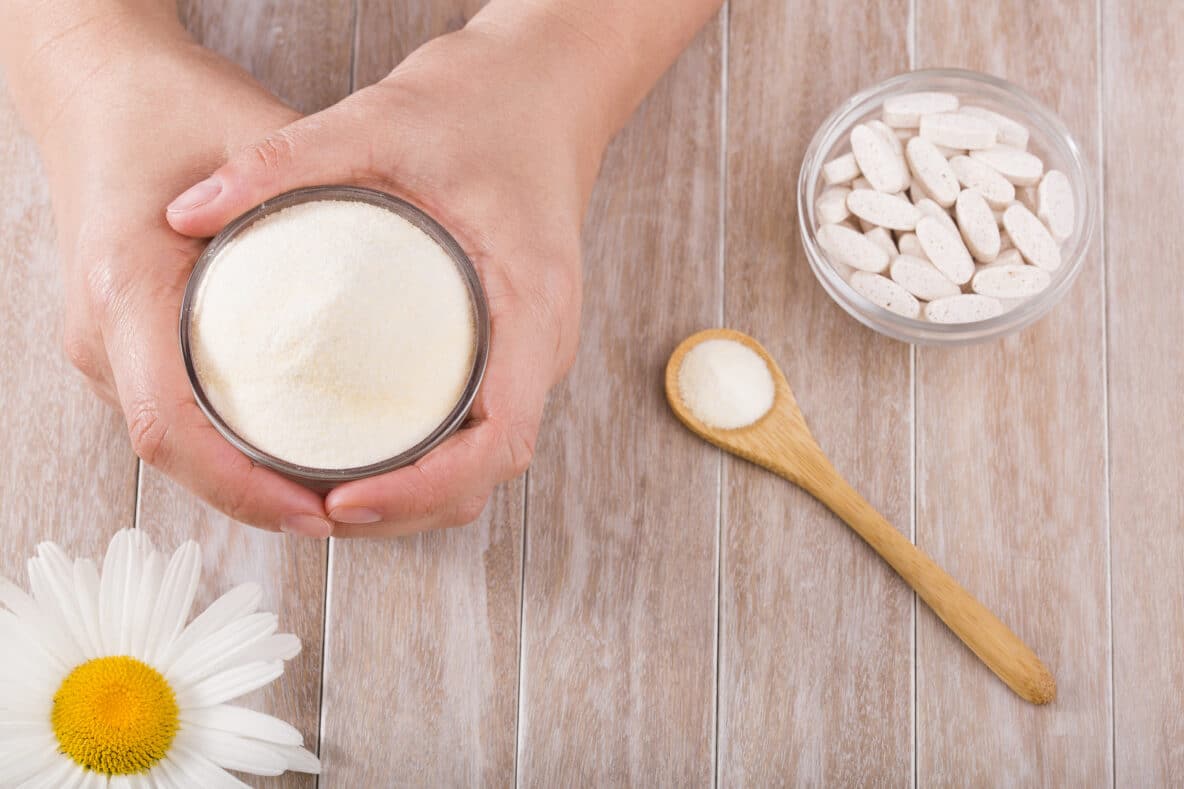Collagen is having a moment in the spotlight right now. You're probably bombarded with adverts and articles about the benefits of taking it, especially for your skin, hair and nails. But is it something you need to be adding to your supplement cupboard?
You can watch the video or listen to the podcast (episode 118)
What is Collagen?
Collagen is a type of protein that pretty much holds our bodies together! It's like the glue of our connective tissue, strengthening our skin, hair, tendons, nails, cartilage, teeth, muscles and bone. And even the lining of our gut and blood vessels.
When you eat protein (eg meat, fish, dairy, soy, eggs, pulses), the body makes collagen from the different amino acids from the food.
What happens to collagen as we get older?
As we age (even from the age of 25!), collagen production starts to decline. And during menopause, it plummets by around 30%. Studies show that oestrogen levels are correlated with its production, so when oestrogen starts to decline, so does collagen. And that shows up in more wrinkles, dry saggy skin, thinning hair, brittle nails and joint pain!
Health benefits
- SKIN; As we age, low collagen (and oestrogen) can result in dryness, lines and loss of definition. Collagen helps to improve elasticity and suppleness of skin.
- HAIR; Our hair is made of keratin, a protein found in collagen, so it can help to rebuild hair and fight the degradation caused by free radicals.
- BONES; Our bone density declines as we age, particularly due to the falling oestrogen levels through menopause. It's not just oestrogen needed for strong bones, its also collagen!
- JOINTS; it is need for good mobility and strength in our joints, especially as we age.
- GUT HEALTH; Collagen contains glutamine and glycine which help to reduce inflammatory processes in the gut lining and improve intestinal permeability (leaky gut).
How to increase your levels
DIET;
Start by eating good quality protein so that you have the right amino acid building blocks to make collagen. This includes good quality (and organic where possible) meat, fish, dairy, eggs, soy, nuts, seeds, soy, legumes, pulses). Bone broth is a great way to increase collagen in your diet.
SUPPLEMENTS;
Diet may not be enough if you're over 40. Supplements can really help to boost your levels. There are different qualities and types to consider;
- Animal Based – the majority of supplements use animal based collagen (sources from beef, pork, chicken or fish). It is similar to human collagen but is missing the amino acid tryptophan so it's not a perfect match. One of my favourites is Hunter & Gather collagen peptides – bovine or marine (it's tasteless so you can mix it in your tea/coffee, water).
- Vegan – as collagen can only come from animals, most ‘vegan' collagens are providing nutrients for your body. However the clever team at FEEL have discovered a patented source of vegan collagen that provides the ratio of amino acids that is identical to human Type 1 collagen. And it tastes really good. Result!
Anyone can benefit from taking collagen supplements, but particularly if you're a woman over 40! They are generally safe, although if you are taking any medication, as with any new supplement, always check with your doctor first.
And if you need personalised help with your health or hormones, do contact us for information on how we can help.

